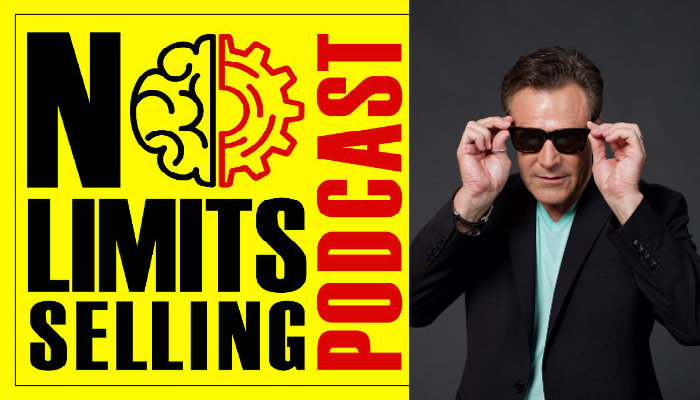Why Self Awareness is Key to Strong Leadership
On Episode 191 of The No Limits Selling Podcast, we have LK (Larry) Kihlstadius, CEO Chair at Vistage Worldwide, Inc. In this episode, Larry shares with us insights on why self awareness is key to strong leadership.
My Cause: Guide leaders to be their best; one conversation at a time. Ask better questions. Drive a better culture. Commit to bold!
My Why: The simple belief that great leaders have a growth mindset. They love to be challenged and gain perspective. I believe being in a peer group is the most effective path to accomplish this outcome.
Pedigree? Sure, I have done some cool things. All-American college wrestler and captain of the team at the United States Naval Academy. Former Officer of the Marines and served on the Commanding General’s staff as only a captain filling a colonel’s billet. Leadership is my passion. One of the early innovators in the Recruitment Process Outsourcing business as well as HR Outsourcing. Quality Blackbelt trained in the very last class taught by Joseph Juran himself...yes...I'm umm...experienced. Oh, and I surf to stay in touch with my young soul!
Proof statements? Established one of the first profitable RPO businesses in the world (became Sourceright bought by Randstad). Senior Executive at Accenture sold HR Outsourcing engagements with TCV for over $1 Billion. Restructured marketing strategies and sales teams at Vistage International leading to the strongest growth in the history of the firm.

Contact LK:
[EDITOR’S NOTE: This podcast is sponsored by No Limits Selling. It is a fun, fast-paced podcast that delivers hard-fought business advice that you can implement today to improve your sales and performance]
Interested In Our Real Estate Coaching Services? Explore Our Website: Link
Feeling Not Well Today? You Can Use Our Mindset Boosters App To amp Up Your Mood: Link
Find us on Social Media:
LinkedIn | Facebook community | Instagram
Like what do you listen to? Subscribe to our podcast!
Ready to become fearless? We can help you become fearless in 60 days so you accomplish more in your career Schedule A 15 min Call with Umar
Summary
Introduction and Background
The podcast begins with an introduction of Larry Kihlstadius, the CEO Chair at Vistage Worldwide, Inc. Larry shares his background, including his early career and how he eventually became involved with Vistage. He discusses his passion for helping others realize self awareness, grow and succeed, which led him to his current role.
Vistage Worldwide and Its Mission
Larry then delves into the mission of Vistage Worldwide. He explains that the organization is dedicated to improving the effectiveness and enhancing the lives of CEOs and business leaders. Vistage provides a platform for these individuals to learn from self awareness, and gain insights that they can apply to their businesses.
The Role of a CEO Chair
Larry discusses his role as a CEO Chair at Vistage. He describes his responsibilities, which include facilitating group meetings, providing one-on-one coaching, and helping members navigate challenges. He emphasizes the importance of self awareness, creating a safe and trusting environment where members can openly share their issues and receive constructive feedback.
The Power of Peer Advisory
The podcast then shifts to the topic of peer advisory, a key component of Vistage's approach. Larry explains how peer advisory works and why it's so effective. He shares examples of how members have benefited from the collective wisdom of their peers. He also discusses the importance of accountability in this process.
Challenges Faced by CEOs and Business Leaders
Larry talks about the common challenges faced by CEOs and business leaders, such as isolation, decision-making, and managing growth. He shares how Vistage helps its members overcome these challenges through peer advisory and leadership development programs.
Conclusion
In conclusion, the podcast features Larry Kihlstadius, CEO Chair at Vistage Worldwide, Inc., discussing his role and the mission of Vistage. He emphasizes the organization's commitment to enhancing the lives and effectiveness of CEOs and business leaders through peer advisory and leadership development programs. Larry explains the power of peer advisory, where members learn from each other's experiences and gain insights to apply to their businesses.
He also highlights the common challenges faced by leaders, such as isolation and decision-making, and how Vistage helps to address these issues. The podcast underscores the value of self awareness in fostering personal and professional growth and encourages leaders to consider joining such groups to improve their leadership skills and business outcomes.
Questions & Answers
Who is Larry Kihlstadius?
What is Vistage Worldwide, Inc.?
What is the role of a CEO Chair at Vistage?
What is peer advisory and how does it work at Vistage?
What are some common challenges faced by CEOs and business leaders?
How can joining a peer advisory group like Vistage enhance a leader's personal and professional growth?
Don’t miss this opportunity to transform your real estate career with one-on-one coaching. As an experienced real estate coach, I, Umar Hameed, am dedicated to helping you unlock your full potential and achieve your real estate goals. To learn more about who am I and my clients ↓
If you’re ready to take the next step, book an appointment with me today and begin your journey toward success in the real estate industry.
